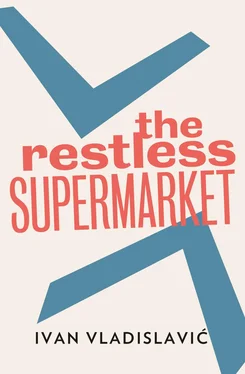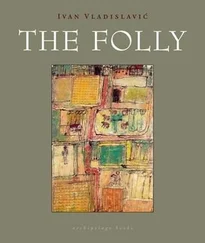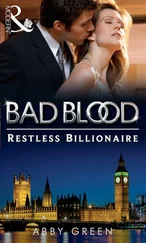Spilkin stirred the shields thoughtfully, unintentionally upstaging Mevrouw Bonsma. ‘You try one, Merle.’
‘You’re good with names,’ I put in.
‘What a lovely name. Almost an echo.’
‘That’s close.’ I looked over her shoulder. ‘She has left in a confusing echo. Five letters.’
‘Chloe,’ said Spilkin like a shot.
‘Chloe Mulrooney, to be precise, 1933.’
‘Biscuits?’
‘Wouldn’t it be nice if there was a Dymphna.’ Merle might have been turning over her own fragile girlhood in her fingers.
Erica. I care for her. Easy as pie.
‘My turn.’
‘Aubrey! What’s wrong with your finger?’
‘Brasso.’ It was black to the second joint. ‘I was up half the night cleaning this thing.’
‘Don’t go native on us, Tearle.’
‘You can’t walk around like that. People will think … I’m not sure what they’ll think.’
‘They’ll think he’s got a finger in the wrong pie,’ said Spilkin. ‘Mulrooney. Or mulberry.’
Macaroony. Macaroni. Merle was unpacking her handbag. Spilkin raked the shields over to his side of the table as if he had won them fair and square. A pair of bluntnosed scissors, made for the nursery. A season ticket for the bus. Where did she go by bus? She had a daughter in the northern suburbs somewhere, Illovo or thereabouts, and grandchildren she sometimes babysat. Jason (the leader of the Argonauts) and Kerry (a county in the Republic of Ireland). A packet of Romany Creams. A book of horoscopes. A cardboard box full of Johnson and Johnson earbuds: little blue and white dumb-bells. Tissues. And now finally what she was looking for: a bottle of acetone. She tipped some of it onto a pad of tissue paper and dabbed at my finger. It made no difference whatsoever. But it was so long since anyone had touched me tenderly that it brought a lump to my throat. What the rhinopharyngealists might call a tracheal clonus.
At Merle’s suggestion, Mrs Mavrokordatos put the trophy on a shelf behind the counter, in pride of place above the coffee cups, where it was to remain in anticipation of the joyous day when I would present it to the first deserving winner. It was a shame I wouldn’t be able to compete myself, but there seemed to be no way around it.
*
In its own way, governed by its own laws, ‘The Proofreader’s Derby’ kept growing. Although I spent a good part of each day at home and each evening at the Europa working on it, I was no nearer finishing. As fast as I eliminated entries from the System of Records, new ones took their place. Standards were slipping. Where once one had been obliged to scour the world minutely for eligible corrigenda, now every printed surface was flyblown with them. My research assistants heaped fuel on the fire.
On top of all this, as I left the Café one night, I carelessly let fall from my file a page containing the following fascicle:
In the small hours of that bitter morning, Fluxman stood sleepless at the window of his penhouse, looking down on Alibia. Tutivillus Heights was the city’s only skyscarper — in Alibia, the top of a six-story block will brush the brow of heaven — and it made him feel immensely alert and far-seeing, and utterly detached from the earth. His eyes wandered from rooftop to rooftop, from street to street. He felt it. The building was swaying, a motion so gentle it would have escaped the notice of all but the most perceptive observer. It was not soothing at all; it filled him with foreboding. Then he recalled who he was and what he stood for. He erased his frowning mistgivings from the glass before him with an eraser shaped like an egg, but they came back again and again.
Eveready, it emerged afterwards, retrieved the page from under a table and passed it on to Spilkin, who thus had the good fortune of becoming the first person to lay eyes on a sustained passage of ‘The Proofreader’s Derby’ (even Merle had tasted no more than a line or two). Out of context, it was not at its best; I dare say it was like a scrap of canvas hacked from the frame with a pocket knife — and I give it here precisely to demonstrate that fact. But Spilkin seemed to understand perfectly. The following evening, I found the missing page on a plate by my chair, spindled and clasped by a serviette ring, along with a note in Spilkin’s sharply focused hand.
My dear Tearle,
What a luck to enter the world of your imagination at last, even if it was through the back door, where there is no sign to reserve the right of admission. The whole thing breathes and sweats and so on. You should be in no great hurry to finish: the longer you spend on it the better, I think. It was very exciting looking for ‘corrigenda’. You’ll make a proofreader of me yet. You might even start a craze. I found
Line 2: ‘penhouse’ for penthouse
Line 3: ‘skyscarper’ for skyscraper
Line 10: ‘mistgivings’ for misgivings
You must let me know how I faired.
Sincerely,
Spilkin
I was disappointed to see that he’d missed ‘story’ for storey . But he hadn’t done too badly.
Then that ‘faired’ grabbed my attention. Automatically, my mind performed a flawless backflip from Spilkin to spillikin — one of the wooden or ivory slips thrown in a heap in the game of spillikins to be removed each without disturbing the rest — and then reeled off-balance into spell-I-can, into spell-I-can’t. I’d expected more of him.
Or was he having me on?
*
‘No great hurry’ … hasty advice on Spilkin’s part, hastily accepted on mine. Five years had slipped by since then, and I was still trying to finish ‘The Proofreader’s Derby’. Why did Empty Wessels have to start this Goodbye Bash business and go raking up the past? There was so much of it too, a mountain of bygones. And the bit that was mine, the bit I had to show was so paltry, a scant barrowload. Has my whole life come down to a pile of papers, I asked myself, and those riddled with corrigenda? Would I have to say, looking back, not ‘It was all one big mistake,’ but ‘It was an endless succession of little mistakes’? More than I care to remember, let alone to correct. There might be some saving grace in a great mistake, boldly made — but in an unbroken line of piffling errors?
I was losing faith, or had already lost it. God knows, the past few years have given me cause.
The TO LET signs had gone up in the windows of the Café Europa. The Bash loomed. I had promised myself that I would finish ‘The Proofreader’s Derby’ before then, by hook or by crook; that when the doors finally closed on the Café Europa, I would also close the book on this chapter of my life. I might even make something of the occasion, a little ceremony, a brief speech. But now I felt like taking my papers — files full of clippings, boxes of index cards, notebooks, typescripts of fascicles, the lot — and throwing them over the fence into the open plot in Prospect Road, scattering them among the green clumps of weeds where the body had lain that Sunday morning, obscured by the news, in the shadow of the sign that said No Dumping — By Order. Dumping was the done thing, to judge by the piles of rubbish already left there, another inexplicable mania. Perhaps the Queen of Sheba or one of her consorts, whose rotten kingdom this was, would find my disjecta membra useful to kindle fire when they cooked their tripe and tubers, to cover themselves at night when they slept like the dead, to wipe their illiterate backsides when they did their business.
Filled with despair, I packed every last scrap of paper connected with ‘The Proofreader’s Derby’ into two enormous grey-paper shopping-bags with handles of gallows hemp and the ignominious stars and stripes all over them — two of the matching set of three that was Moçes’ unexpected gift to me the Christmas before — and went out into the street. I could hardly carry the blinking things. The nightwatchman Gideon offered to lend me a hand, and I had to give him the abridged version of my talk on his responsibilities, which were to open and shut the door for the tenants of Lenmar Mansions and to guard their fixed and moveable assets, indeed to frustrate the relentless efforts of criminals to transform the one kind into the other. What was fixed anyway? There were people, deprived creatures without garages, who resorted to chaining their cars to trees at night to secure them against car thieves. But that faith in growing, rooted things was misplaced: there were tree thieves as well, preying on the municipal flora. As fast as the Parks Department planted trees and shrubs on traffic islands and freeway embankments, thieves dug them up and carried them off, either to replant them in their own gardens or to resell them. Another species of thief stole manhole covers and sold them to scrap-metal dealers. Yet others specialized in bus-stop benches and kerbstones, street signs and fences, water pipes and electricity cables, milestones and monumental masonry. Material for building shacks. Entire houses had been stolen by these cannibals, even schools and factories.
Читать дальше












